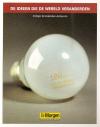Boekenkast

Ideeën die de wereld veranderden, De
Auteur | Felipe Fernández-Armesto |
Eerste Uitgave | 2004 |
Uitgave | 2004 |
Uitgeverij | De Morgen |
Vorm | non-fictie |
Taal | Nederlands |
Bladzijden | 224 bladzijden |
Gelezen | 2004-04-11 |
Score | 7/10 |
Inhoud
Dit unieke boek leert on hoe de samenleving geworden is wat ze is: door denken en verbeelding. Ideeën zijn de motor van elke verandering en vooruitgang. Ideeën zijn zo oud als de mensheid. Uitvindingen en ontdekkingen, economische systemen en politieke bewegingen, onze omgang met mensen, dieren en dingen: het vind allemaal zijn oorsprong in een origineel idee.
Van kannibalisme tot zen, van tijd tot het onbewuste, van logica tot de chaostheorie... Dit boek is een fascinerend naslagwerk over de geschiedenis van de mensheid van de oertijd tot nu, aan de hand van de sterkste ideeën. Iets om over na te denken.
Bespreking
Fast food for the soul
This unique book illustrates how our world has become what it is today: by thinking and using imagination. The fundament of this book is that ideas are the driving force behind change and progress. Ideas are as old as mankind. Discoveries and inventions, economic systems and politic movements, our contact with people, animals and daily objects: all find their birth in an original idea. From cannibalism to Zen, from time to the unconscious, from pure logic to the chaos theory...
The 'idea' behind this book is as remarkable as it is refreshing. It all starts in prehistoric times and takes the reader on a long, but exiting trip through time. One hundred ideas are briefly discussed and presented to the reader as some fast food for the mind. Not all ideas are as natural as for example the invention of writing, but put into a boarder perspective each of them shows significant influence on the course of history. As a consequence of this book's setup every idea only takes up two pages. No one can expect that this limited coverage is enough to fully communicate what each idea really signifies. This is certainly the weakest point of this anthology. It is certainly not surprising that not everyone will agree to the interpretation of certain ideas. But at least this book gives the incentive to numerous interesting discussions.
As a remedy to the compactness the author has added a 'further reading' section to each idea, a gesture that is highly appreciated and that is certainly one of the main assets of this thought provoking book. A great starting point for everyone who frequently asks the question: why?